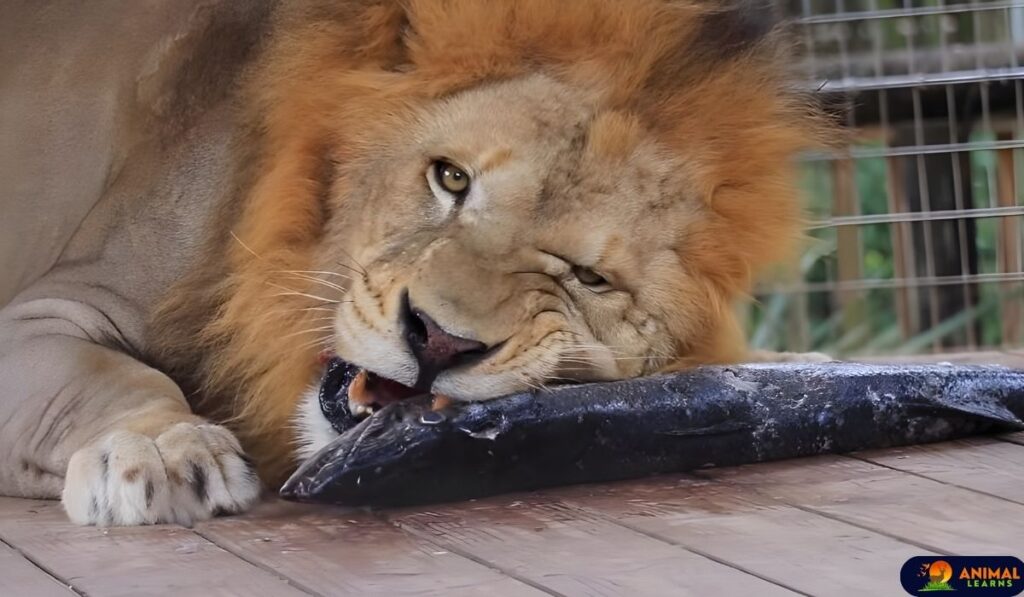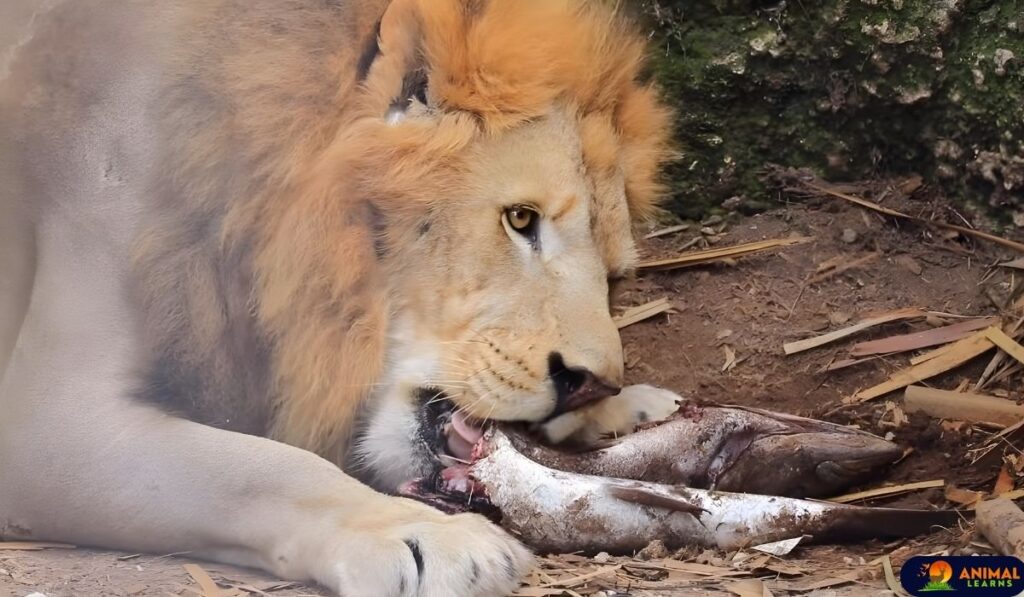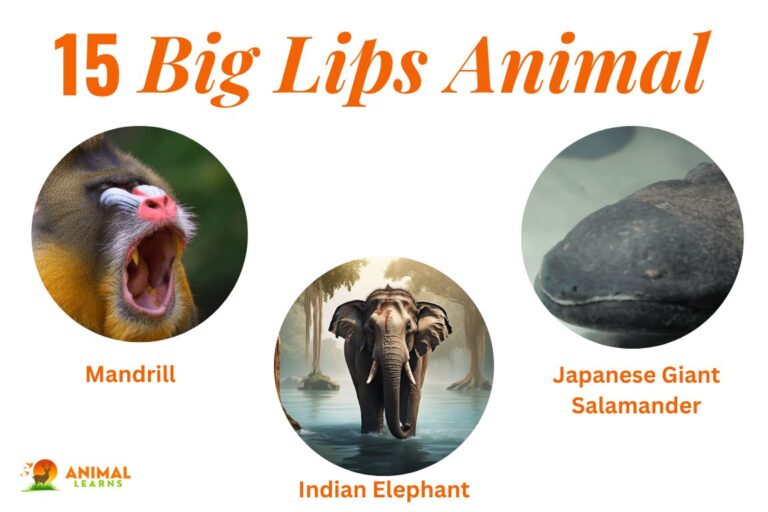Do Lions Eat Fish? An Amazing Fact About Lions

Do Lions Eat Fish? Lions typically prefer ungulates like antelopes and zebras but occasionally consuming fish is an intriguing idea. Lions are not natural fish hunters, and their diet primarily consists of terrestrial mammals.
In this article, we will explore this fascinating question and find out the truth.
Do Lions Eat Fish: A Part of the Lion’s Diet?
Contents
While fish may not be a main part of a lion’s diet, there are times when these majestic hunters go into bodies of water. Lions have been seen fishing or even scavenging for fish when they get the chance. However, this behavior is not very common and mostly happens in certain areas and situations.
However, can lions eat fish? On rare occasions, lions may opportunistically consume fish when they encounter them near water bodies. This behavior is typically driven by specific circumstances such as scarcity of their usual prey or curiosity.
It’s important to note that will lions eat fish is not a straightforward guarantee, as their dietary preferences lean heavily towards land-dwelling animals.
In Search of Prey:
Lions are amazing hunters who know how to track and catch prey. They use their sharp senses and strong bodies to go on a sneaky hunt, ready to attack at any time. These majestic animals watch their surroundings carefully, picking the best target to chase.
They use their keen eyesight to spot prey from far away, which makes them excited. The lions study the herd, looking for the weak and vulnerable ones as their easiest chance of a successful hunt.
As they get closer to their target, the lions move silently, hiding their presence until they are near enough to strike with a powerful burst of energy. With incredible speed and strength, they grab their prey tightly, using their deadly jaws to choke or snap the victim’s neck.
The search for prey is a true show of the lion’s amazing hunting skills and their strong will to survive in the wild African savannah.
Is Fish a Food Source for Captive Lions?

Yes, fish can be a food source for captive lions. While it may not be their primary food source, fish can be included in their diet to provide variety and additional nutrients.
Fish are an excellent source of protein, omega-3 fatty acids, and essential vitamins and minerals that are beneficial for the overall health of lions.
However, it is important to note that lions are primarily carnivorous and generally rely on meat from land animals, such as antelopes and zebras, for their sustenance.
Nonetheless, fish can be occasionally fed to captive lions as a treat or supplement to their regular diet.
Do Wild Lions eat Fish?

Do Lions Eat Fish? Fish are not a usual part of a wild lion’s diet. Lions are the top hunters of the land, adapted for hunting animals that live on the ground, mainly hoofed animals like antelopes, zebras, and wildebeests.
However, sometimes wild lions may eat fish when they get the chance, such as finding fish stuck or easy to catch near water sources, or when they are hungry and their normal prey is hard to find. These rare interactions with fish are not a regular dietary choice for wild lions.
What is the Daily Food Consumption of Lions?
Lions are known for their ferocious appetites, as they are apex predators and carnivores. Their diet primarily consists of large ungulates, such as zebras, wildebeests, buffalos, and even smaller prey like impalas and warthogs.
Due to their size and energy requirements, lions have a considerable appetite and can consume a substantial amount of food each day.
| Gender | Average Daily Meat Consumption |
| Lioness | 5-7 kilograms (11-15 pounds) |
| Adult Male Lion | 7-9 kilograms (15-20 pounds) |
Water and Lions

Water is a crucial element in the lives of both lions and humans. Just like humans, lions rely on water for survival. These majestic creatures live in habitats where freshwater sources are limited, making access to water a matter of life and death.
Lions typically inhabit areas with access to rivers, lakes, or waterholes, as they need to drink water daily and also rely on it to cool themselves off during hot weather.
In addition to drinking, water also plays a vital role in the hunting strategies of lions. They often wait near water sources such as rivers or watering holes, patiently observing their prey, and ambushing them when they come to quench their thirst.
Therefore, water acts as a lifeline for lions, enabling them to sustain themselves in their natural environments.
Unique Habits and Adaptations
Do Lions Eat Fish? Lions are not as good at catching fish as they are at hunting on land. Their body is not made for aquatic hunting, with features more suited for capturing and overpowering large hoofed animals. Their muscular body structure, powerful legs, and strong jaws are better adapted for the pursuit and ambush of land-based prey.
Lions, the majestic and powerful predators of the animal kingdom, possess a number of unique habits and adaptations that aid in their survival and dominance. One remarkable habit of lions is their social structure and hunting strategy.
Unlike many other big cats, lions are highly sociable animals that live in pride consisting of related females, their offspring, and a few adult males.
This cooperative behavior allows them to form complex hunting groups, maximizing their chances of successfully taking down large prey such as zebras or buffalos. Additionally, lions possess physical adaptations that make them formidable hunters.
With their muscular bodies, strong jaws, and sharp retractable claws, they are capable of chasing down swift prey and delivering a swift and deadly blow.
Lions have also adapted to their habitats by developing a unique roar that can be heard up to 5 miles away, enabling them to communicate with distant pride members and warn off potential intruders. These distinctive habits and adaptations contribute to the lion’s status as the king of the savannah.
The Exceptional Cases:
In some rare cases, lions, known for their primarily terrestrial hunting, have been observed consuming a variety of aquatic creatures, such as fish. The question ‘Do lions eat fish?’ arises in such scenarios. For example, in the Okavango Delta area of Botswana, where seasonal flooding turns large areas of land into underwater habitats, lions have been spotted preying on fish trapped in shallow waters.
These exceptional circumstances offer a unique opportunity for this normally terrestrial predator to enjoy some piscivorous behavior.
Conclusion
Although fish is not a regular food for lions, they have been observed hunting fish during certain circumstances. Overall, their preference for terrestrial prey is clear, given their physical adaptations and hunting techniques.
While the behavior of hunting fish may not be typical for lions, it adds to the interesting variety of their dietary choices, showing their adaptive abilities as skilled hunters in the animal kingdom.
FAQs
What animal do lions not eat?
Lions do not typically eat animals like crocodiles, vultures, and other large predators.
What foods do lions eat?
Lions primarily eat herbivores such as antelopes, zebras, wildebeests, and buffalo.
What is a lion’s favorite animal to eat?
Lions often favor larger herbivores like wildebeests and zebras.
What is a lion’s worst enemy?
Lions’ worst enemy in the wild is often other lions from rival pride, but they can also face threats from hyenas and humans.
Which animal can defeat a lion?
In the wild, some animals that can potentially defeat a lion include large, adult elephants, and groups of well-coordinated hyenas or African buffalo.












